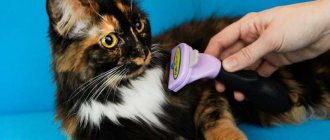Increased activity is observed at times in almost all cats. Without any reason, the cat runs around the apartment like crazy and it’s quite difficult to stop. Sometimes this is accompanied by the fact that the animal purrs, screams unbearably and makes other vital sounds. This behavior can usually occur in young and immature cats, as they still have youthful energy. But when such rabies manifests itself in an adult pet, you should immediately understand all the possible causes.
Feline hyperesthesia syndrome (FHS)
Feline hyperesthesia syndrome (FHS) is a rare cause of a cat acting crazy, although it most often affects mature cats and the cause is unknown.
Discuss the possibility of FGC with your veterinarian if you notice that:
- The skin on your cat's back seems to move as it runs.
- Your cat often bites her back above her tail, even if you have properly treated her for fleas.
- Touching the base of a cat's tail or back causes her to scratch, scratch, or bite violently at the area and then run madly around the house.
Common Causes
If you figure out why your pet shows negative emotions, you can avoid conflict and even traumatic situations.
Defense: self, cubs or territory
Not only dogs, but also cute fluffies are able to protect themselves, kittens or their territory from surrounding people or animals. The adult feels like the owner of the home, and therefore experiences irritation if someone wants to encroach on it.
The furry friend will use terrifying sounds to drive uninvited guests out of his territory. Mothers are especially active, who in this way try to drive the stranger away from the nest with kittens.
Manifestation of fear
Specific sounds can be caused by certain fears of the cat, which are usually associated with insufficient socialization or regular physical punishment. The fact that deviations in behavior are provoked by a feeling of fear is indicated by warning poses (standing sideways, half-turned), attempts to inflict injury with claws, and subsequent demonstrative licking of the fur.
A pet may hiss at a vacuum cleaner, at loud guests, or at an unexpected sound or touch. Fright is often accompanied by a fluffy tail.
Aggression
Sometimes a cat's hissing is explained by an aggressive attitude aimed at a specific person or animal with which negative memories are associated. For example, a guest could step on a tail, paw, or offend during a previous visit. Or the neighbor's dog is constantly trying to catch up and sniff the mustache.
The owner himself is capable of provoking aggression. Sharp shouts, frightening gestures or trips to the vet are good enough reasons for a mustachioed friend to hiss. If a pet has not experienced tenderness and affection from a person since childhood, then he will begin to scream and hiss at him during any attempts to get closer.
Unmotivated aggression is often caused by sexual desire or hormonal imbalance. If a cat hisses at everything for no reason or reason, it is better to take him to the vet and have him neutered. The same applies to females.
Illness or state of anesthesia
If a gentle and affectionate purr begins to demonstrate repeated aggressive behavior, this may indicate the presence of health problems. Among the diseases that accompany inadequate reactions are:
- food and chemical poisoning;
- epilepsy;
- toxoplasmosis;
- hormonal disbalance;
- rabies.
An injured animal, in pain, will hiss and growl at a person who wants to help. Operated pets who have not fully recovered from anesthesia and have lost the ability to navigate in space react the same way.
Trying to communicate something
Sometimes a cat is forced to hiss to attract the owner's attention. This happens after a mustachioed friend called out to a person by meowing repeatedly, but he did not respond.
In this case, the fluffy feels displeased and makes frightening sounds.
This behavior is most often demonstrated by poorly raised or overly spoiled pets. If the mustache constantly behaves this way, then measures must be taken to re-educate it.
What information should you provide to your veterinarian?
First of all, the owner tells the specialist in detail about how the convulsions proceeded. Then he informs the veterinarian about the presence of chronic diseases in the cat, lifestyle, diet, and what medications she is taking. Additionally, the following facts are reported:
- the age of the animal, whether there have been seizures before;
- nature of the pathological process: constant, long-term, fast;
- when convulsions begin: the cat sleeps, eats, at what time of day;
- what is the diet: natural or industrial feed;
- the presence of stressful situations before the development of convulsive syndrome.
Square and circle
When a cat looks closely at a wall that has not been subject to any changes by members of the household, this means that the wall has been “occupied” by a midge, or a mosquito, or a spider; a speck of dust, speck, fluff, etc. has settled on it. As a hunter, it is important for a cat to know “where the wind is blowing”, i.e. what it is. Plus, the meowing creature, as one of the most curious animals in the world, is interested in the development of this situation. Surely, the cat is wondering where this insect came from, and where it will go later. This wall is like Kazimir Malevich’s “Black Square” - a bright circle for a cat to think about.
And another answer: for the tailed purr, as one of the cleanest animals on Earth, it is important to know when the wall will shake off this disgrace, or when its owner will do so. The gaze of the pet speaks eloquently about this, even screams. A cat and a cat speak a similar language to people.
When a cat looks into the eyes of its owner, it means that the animal wants something: to understand the mood of its older brother, to catch the wave of his mood. And then, having figured out this moment for himself, he begins to say with his eyes what he needs - either a fun game, or a hearty meal, or change the water in the bowl, or the filler in the tray.
Behavioral disorders
Cats are vindictive and can take good revenge on their offenders. In fairness, it should be mentioned that they also remember good things very well. If an animal is often offended, poked, not caressed, not paid attention to, or driven away, you should not be surprised that it begins to take action. And he has only three methods of revenge available to him:
- shitting or urinating in the most inappropriate place;
- bite or scratch a careless or evil owner;
- prevent owners from living in peace, annoying them with loud and unpleasant screams day and night.
Basically, this behavior is characteristic of cats that have gone through cruelty and neglect of their owners. Even if they have a different, kind and affectionate owner, they will not immediately overcome their character. It will take a lot of time and effort to regain your pet's trust, pacify his temper and get rid of constant howling and whining.
Why does a cat rush around the apartment and what to do about it?
What does a cat do most of the day? If you say that she is sleeping, then in the vast majority of cases you will be right. A healthy adult cat can actually sleep up to 16 hours a day.
But sometimes the lazy (at first glance) purr seems to switch on a different mode and she begins to rush madly around the house, from one end of the apartment to the other, sometimes pushing and crushing carpets and rugs and knocking over things that get in her way. Is this normal? What to do about it? “Murkosha”, as always, will give answers.
- 1) Why does the cat most often rush around the apartment?
- 2) How to ensure the safety of things and healthy sleep
- 3) If the cat is alone for a long time
- 4) Health problems
- 5) Sexual instinct
- 6) The cat is trying to wake up the owner
Why does the cat most often run around the apartment?
Some owners believe that the cat is having some kind of “seizure” at this moment. No. In most cases, this is absolutely normal behavior, determined by instincts and lifestyle. Cats rush around the apartment because they are predators, their instincts tell them so. They constantly need to move to keep their body in good shape. In this way they improve their hunting skills. After 5-10 minutes, the cat usually gets tired and lies down to rest. These bursts of activity are completely natural, especially for kittens and young cats.
Sometimes a cat has an additional goal - to attract the attention of the owner. Especially if the owner does not spoil his pet with attention too often. But even if you often play with your cat, even if he has a wide variety of toys, this behavior can still be an invitation to play. All cats have very different habits and preferences, including in games. For some cats, there is nothing better than hide and seek and chase, and this requires at least two. Don't deny your cat attention, at least don't do it too often. Cats are very sensitive animals, and such neglect can cause your pet to become stressed. And stress often leads to various behavioral problems.
If you cannot support games of hide and seek and chase, or such activity is unacceptable for you for some reason, you can redirect the cat’s energy in another direction (more on this below).
So, this behavior in itself is normal - the kitten runs around to let off steam and keep itself in good shape. It’s good when this happens during the day and your things don’t suffer. Then it's even fun to watch. But sometimes this can turn into a problem.
- When a cat rushes around the apartment, he often also jumps to higher places. Often there are already some things in these places, sometimes fragile and valuable. Naturally, these things can fall or even break when the cat jumps.
- Cats are nocturnal animals after all. During the day they rest more. But if by night they have accumulated a lot of excess energy, they will definitely decide to throw it out. The kitten will begin to rush around the apartment, preventing the owners from sleeping. And none of your screams and exhortations will help here, if only because for him such behavior is quite normal in this situation. Locking a kitten somewhere is also not a solution - it will meow loudly and ask to be let out. Put yourself in his place: you are full of strength and energy, thirsty for action, ready to move mountains, but you are told to just sit quietly and not disturb anyone - and nothing else. And so on all the time.
How to ensure the safety of things and healthy sleep
Here you probably have a question: is it possible to make sure that the cat lives a full active life, and things remain safe and sound, and the owners get enough sleep? Of course you can! Moreover, it is not difficult at all.
To begin with, valuable and/or fragile items should be placed out of reach of the cat. When we say “inaccessible,” we do not mean those where the cat “cannot” climb, but those that it cannot reach even if it wants to. This must be done in any case, even if your pet does not like to run and jump too much. Firstly, the mood may change. Secondly, all cats love to explore the territory, and if your pet has not explored something yet, but he has the opportunity, then he will almost certainly eventually do so.
Next, the cat needs to be provided with an alternative. If your cat runs around at night, play with it (perhaps like catch) just before bed. But only so that she gets tired, that is, she lies down and does not show any desire to continue playing. If the cat is not tired enough, it will continue to run around at night. This can be noticed if the pet does not lie down, expects some action from you, looks at you while its pupils are dilated, touches you with its paw, etc. But if you really exhaust your cat, she will sleep without her hind legs and won’t wake up until the morning.
Are you not satisfied with the format of races around the apartment? No problem - show your cat other games. Special “fishing rod” toys are best suited. A game for a cat is something like hunting. Let the toy be his “prey.” Accordingly, it should resemble prey: remain at some distance from the cat, “run away” or “crawl away,” fly up, to the side, change the direction of movements, and look for shelter. Almost no cat can resist chasing this one.
Read more about games: Why do cats play and how to do it correctly with them?
Such games have two goals at once. Firstly, they will exhaust your pet no worse than running around the apartment. Secondly, in the process, the person guides the cat with the help of a toy. Play with her where she can, and take her away from places where she doesn't want to run or jump. A maximum of 15-20 minutes of such a game (if everything is done correctly) - and the cat itself will want to rest. 2-3 sessions a day will fully satisfy an adult pet’s need for games and a burst of energy. Of course, you need to play with the kitten more. It's best to play before giving your cat food. Then the cat’s behavior model in natural conditions will be reproduced: hunting - catching prey (the game should always end with the pet catching the toy) - food - sleep.
If the cat is alone for a long time
It’s not very good if an overly active cat (a kitten or just a representative of a super-energetic breed like an Abyssinian or Egyptian Mau) is left alone most of the day. It’s not very good both for him, because it will be hard for him to endure loneliness, and for the apartment, because such a pet will definitely look for something to cheer himself up. Therefore, the Murkoshi team insists that the owner’s work schedule and pace of life should play an important role in choosing a pet.
More information about choosing a breed: https://www.murkosha.ru/nashi-stati/interesnoe-o-koshkakh/kakoj-porody-kota-luchshe-zavodit
We recommend getting a kitten only if there is an adult in the apartment who can look after it (and play with it) most of the day.
And yet, if you have a playful pet and you don’t want him to get bored (and knock over your things, trying to occupy himself), but you have to leave him alone from time to time, then we recommend, in addition to the standard balls, mice and teasers, purchase various interactive toys: tracks, puzzles, mazes, toys with hidden treats, etc. - in general, everything that can attract the cat’s attention for a long time. The more he occupies himself with these toys, the less he will just run around the house.
Read more: Interactive toys for cats: why they are needed and how to use them
And for cats who love to run, we recommend installing a running wheel like this:
Your pet will definitely appreciate it!
Until now, when we talked about the kitten running around the house, we only meant its desire to play. In most cases, this is actually explained by the game. But other reasons are also possible.
Health problems
Sometimes the pet attracts the owner’s attention in this way, trying to show that something hurts or that something is causing him discomfort. Or it could be some kind of neurological disorder. Especially if the cat is running in circles or running sideways, this is almost always the result of a medical problem. In this case, you should immediately show your pet to a veterinarian.
Perhaps the cat runs actively because he wants to, but cannot go to the toilet, and after such runs he succeeds. If this is not the first time you notice a connection between running and going to the litter box, you should also contact your veterinarian. Perhaps the cat's intestines are not working as they should.
Sexual instinct
Running around the apartment often happens if you have an unspayed cat or an unsterilized cat. During a period of hormonal peak, an animal looks for a partner in this way. This is usually accompanied by other behavioral problems: loud meowing, constant marking, refusal to eat, and cases of aggression are also possible.
If this is the case, then in fact only castration/sterilization can help. Everything else will either have no effect, or will give a purely short-term effect, or will lead to serious health problems (in the case of using various hormonal drugs). But castration/sterilization is a completely safe operation that will save both you and your pet from many problems. Moreover, the operation will not affect your character at all!
Read more about sterilization: https://www.murkosha.ru/nashi-stati/kastratsiya-i-sterilizatsiya/8-mifov-o-sterilizatsii-koshek
At the Murkosha shelter, all children over 6 months old are castrated or sterilized, but this does not prevent them from playing, being active and enjoying life. Come visit us and see for yourself!
The cat is trying to wake up its owner
There may be such a curious explanation. If your cat jumps on your bed in the morning and then suddenly takes off from it (or if the path of the run passes through your bed and your body), then she is clearly trying to wake you up. This happens if you feed your cat immediately after waking up. So she developed a reflex: the owner stood up - food appeared. The cat gets used to the fact that in order to get food, it is necessary to wake up the owner as soon as possible. If you do not want your cat to become a kind of “alarm clock” for you, do not give in to its demands until it becomes a habit. It is best to feed your pet not immediately after getting up, but, for example, before leaving for work. It is highly advisable to play with the cat at least a little before this.
Thus, the fact that a cat runs around the house is a very common and, in general, normal phenomenon. As a rule, this indicates the pet’s desire to play, the need to throw out energy. It is enough to satisfy this desire by directing it in the right direction with the help of toys, and everything will be fine, the cat will calm down. But in some cases, a visit to the vet or spay/neuter (if not already done) will be required.
Feline hyperesthesia syndrome (FHS)
Feline hyperesthesia syndrome (FHS) is a rare cause of a cat acting crazy, although it most often affects mature cats and the cause is unknown.
Discuss the possibility of FGC with your veterinarian if you notice that:
- The skin on your cat's back seems to move as it runs.
- Your cat often bites her back above her tail, even if you have properly treated her for fleas.
- Touching the base of a cat's tail or back causes her to scratch, scratch, or bite violently at the area and then run madly around the house.
Medical reasons why the cat stopped going to the litter box
Hormones
A cat may ignore the existence of the litter box due to the start of a rampage of hormones. This is the first reason why cats, growing up, begin to shit past the tray, but not nearby.
The hormonal levels become very high, and therefore the behavior of the adult pet changes.
He begins not only to mark corners everywhere and protruding parts of furniture, but also to leave puddles in different parts of the apartment. In truth, scolding him for this is not justified, since the cat does not understand that he is doing something bad. For him, these are natural, logical actions. Then it is better to castrate or sterilize the cat.
Ignoring the litter box by a cat occurs for only two reasons: behavioral and medical.
Instinct
This is a little different from the rapidly changing hormonal background, although physiologically it is similar. Due to the desire to define the boundaries of its territory, the cat begins to piss not just past the litter box, but anywhere in the apartment.
This is not a whim, but the pet’s natural desire and scolding simply will not work here.
Urological pathologies
Diseases associated with damage to the urinary system are equally common in pets of different sexes.
When some part of the urinary canal is injured, frequent and involuntary urination may occur.
The cat does not have time to reach the litter box, even if it really wants to and pees where it happens. It is possible that stones get into the urinary tract and then the process of urination causes great pain, and may even stop altogether.
In addition to problems with the urinary system, senile deterioration in thinking may develop: the cat does not understand that he is doing something wrong or simply misses.
Diabetes mellitus, hepatitis, intestinal inflammation and colitis can also develop, affecting the nature and painful bowel movements.
If a healthy cat does not want to go to the litter box, then you need to look for the answer in psychological reasons
Predatory instinct
Cats are natural predators, and domestic cats retain this instinct to a certain extent. Sometimes a cat that is freaking out may actually be exhibiting hunting behavior, fighting maneuvers, or escape techniques.
A domestic cat that doesn't need to hunt for food still has to burn off pent-up energy, and this can manifest itself in the form of what appears to be crazy behavior. Toys such as catnip mice, laser pointers, food puzzles and feather wands encourage your cat to use her natural instincts to grab, chase and jump. This exercise is especially important for your cat if she doesn't spend time outside.
Paralytic or mild form
It lasts from 2 to 4 days. A sick cat can be very affectionate, it usually does not leave its owner, but its saliva already contains the rabies virus, which poses a threat to human life. At the onset of the disease, bites are not excluded. The cat gradually becomes restless, then the depressed state increases. The first signs of rabies are drooping of the lower jaw, excessive drooling, and difficulty swallowing. Due to the gradual development of paralysis of the lower jaw, pharynx and hind limbs, it appears that your pet is choking on a bone.
The cat may develop hemorrhagic gastroenteritis.
The cat demands to open the door to the room, but does not go there herself.
It happens that a cat stubbornly meows in front of a closed door to a room, scratches the door with its claws, demanding to be let in immediately. But as soon as the door is opened, she loses interest in this room, turns away and leaves, or freezes on the threshold and does not want to enter.
People involved in the supernatural claim that cats communicate and sometimes become friends with brownies. This is how the cat looks for its friend in the rooms. Therefore, she demands to be allowed into a closed room. But as soon as she sees that there is no brownie in this room, she leaves to look for him further.
From a scientific point of view, the animal’s behavior is explained by the desire to control its territory. All cats consider themselves the owners of the apartment where they live. As the owner, they want to have unhindered access to all premises. The cat must keep everything under control, then it will be calm. Having made sure through the open door that everything is in order in the room, she does not go there as unnecessary.
There are different explanations for the eccentricities of cats. Some people believe in the psychic abilities of pets, while others explain their behavior in terms of reason. But everyone agrees on one thing - the cat is one of the most unusual pets with its own well-established set of habits.
The cat is trying to wake up its owner
Almost all pets of the cat family behave extremely actively in the morning, when their owners are still sleeping. When a cat runs and meows, and sometimes even licks, he is trying to wake up his owners. Such actions may be associated with the animal’s diet. Many people are accustomed to feeding their pets in the morning. That is why the cat tries to get its first meal as early as possible.
How to get rid of cat hair in an apartment: examples at home
In order to eliminate this problem, it is necessary to provide a little more food in the evening than usual, so that the animal has enough not only for the night, but also for the morning.
Poor diet and low mobility
If the diet is disrupted, the cat often wanders around the apartment, which may indicate the presence of certain factors, namely:
- physical inactivity;
- excess body weight;
- eating high-calorie foods.
With a lack of an active lifestyle or after castration, cats often develop obesity, which can cause various diseases in the body. In such cases, it is highly recommended to contact specialists.
Advice! And in order to avoid negative consequences, it is necessary to follow a diet and spend a sufficient amount of time with the animal in order to develop its mobility.
Anomalous theory
There is an opinion that cats can see the other world. Some owners notice that animals often look in various places where there seems to be nothing attractive for them, hide in a corner or chase something that is absolutely invisible to the human eye, while for others this does not happen at all nothing like this. All this depends on the faith of the pet owner. But in the case when the owner does not believe in the other world, a logical explanation for what is happening is immediately found.
Cats can see the other world
How not to react to cats meowing
You need to understand that you cannot hit a cat. He will become afraid of his owner, hide in hard-to-reach places and scream from there. A click on the nose or ear will scare your pet away from the table or forbidden room, but will not silence him.
Spraying with water from a spray bottle will disperse the bullies gathered to fight or silence the screaming monster, but only for a short time. The cat respects the actions of the leader if they are strict but fair. And he perceives ill-conceived punishments as hostile aggression. The animal will begin to hide from the offender.
To talk about feeling unwell
Unfortunately, it is not always easy to eliminate the cause of meowing, especially if its frequency and volume are unusual. If your pet vocalizes at night, he may be trying to tell you that something is wrong. In fact, with many conditions, from kidney disease to urinary tract problems or arthritis, cats meow for help. If it seems to you that your cat is making unusual sounds, it is better to contact your veterinarian so that he can identify a possible disease. However, keep in mind that cats are good at hiding pain. And if they are silent, it does not mean that they are comfortable.
If your pet is older, a common cause may be cognitive dysfunction syndrome. Meowing at night is just one of the symptoms, so consider visiting a doctor.
Symptomatic treatment
If the cat’s usual behavior has changed for the worse and remains so for several days, then the animal should be taken to the veterinarian to find out the reasons.
The following symptoms should alert the owner:
- the coordination of the animal’s movements is impaired;
- changes in heart rate and breathing;
- detached gaze at one point, reluctance to move;
- unjustified aggression;
- licking the fur until it is wet;
- Unreasonably jumping into nowhere, hitting with paws into nowhere, hunting for an imaginary but non-existent object, hitting walls.
If an animal suffers from a physical illness or has internal injuries, it must be treated accordingly. The doctor will conduct an examination and prescribe medications.
If the cat is nervous due to psychological problems, the specialist will prescribe mild sedatives.
At home, you can calm your cat with a few drops of valerian or motherwort. Drugs such as “Stop-stress”, diazepam, cat bayun have proven themselves well.
In severe cases, for example, if the cat is afraid of absolutely everything, and it needs to be transported on crowded public transport for a long time, veterinarians may prescribe sleeping pills. The animal will fall asleep in the carrier and will not show any anxiety. But you should not get carried away with such drugs, and even more so, prescribe them yourself. Sleeping pills are serious medications with a lot of side effects that may not appear immediately. The use of tranquilizers is a one-time measure when there is simply no other way to transport the animal.
Tip #1
If the kitten is very angry, you should try to catch it and pick it up, stroke it and caress it. At this age, the pet grows and develops; it has a lot of energy that needs to be released. Therefore, it is recommended to spend a lot of time with him: pick him up, play, distract him from pranks.
The more you entertain a kitten during the day, the less it will disturb its owner at night, since there will be no energy left for this and its activity will noticeably decrease. You can play especially actively with him a couple of hours before bedtime so that he gets tired. You need to stop playing gradually, making your movements smoother and calmer. If you interrupt it suddenly, the kitten will want to continue and will begin to chase the owner’s legs.
Wants to “walk”
This applies to variants of absolute norms. The cat's natural desire to continue its breed can result in overly active behavior. Females also ask for a cat with a certain frequency. There are 2 solutions here:
Owner's behavior after surgery. Surgical removal of genitalia procedures are performed quickly. But recovery will take some time. During this period, the animals are too weak and need special attention from the owner.
It is unacceptable to leave pets after surgery with sources of possible dangers, in particular water.
The toilet lid should always be down. Other containers must also be closed. In addition, it is important to take care of a balanced diet and avoid the development of obesity.











